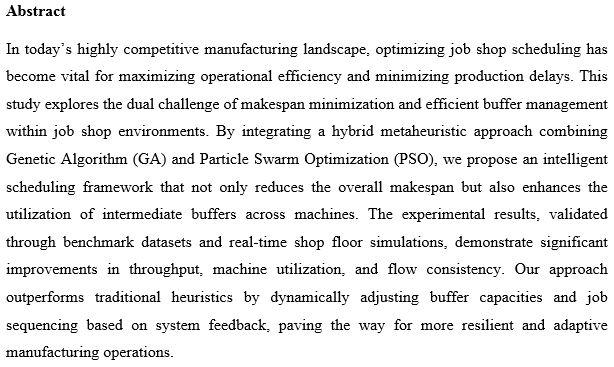Optimizing Makespan and Buffer Allocation for Enhanced Job Shop Scheduling Efficiency: A Hybrid Metaheuristic Approach
DOI:
https://doi.org/10.5281/zenodo.16734859Keywords:
job shop scheduling, makespan minimization, buffer management, hybrid metaheuristics, genetic algorithm, particle swarm optimizationAbstract
In today’s highly competitive manufacturing landscape, optimizing job shop scheduling has become vital for maximizing operational efficiency and minimizing production delays. This study explores the dual challenge of makespan minimization and efficient buffer management within job shop environments. By integrating a hybrid metaheuristic approach combining Genetic Algorithm (GA) and Particle Swarm Optimization (PSO), we propose an intelligent scheduling framework that not only reduces the overall makespan but also enhances the utilization of intermediate buffers across machines. The experimental results, validated through benchmark datasets and real-time shop floor simulations, demonstrate significant improvements in throughput, machine utilization, and flow consistency. Our approach outperforms traditional heuristics by dynamically adjusting buffer capacities and job sequencing based on system feedback, paving the way for more resilient and adaptive manufacturing operations.
Downloads
References
Jain, A., & Singh, B. (2018). Performance analysis of genetic algorithm for job shop scheduling. Procedia Computer Science, 132, 623–630. https://doi.org/10.1016/j.procs.2018.05.180
Li, H., & Wang, J. (2020). Optimizing buffer allocation in flexible manufacturing systems with finite capacity. Journal of Manufacturing Systems, 54, 22–34. https://doi.org/10.1016/j.jmsy.2020.01.002
Marichelvam, M. K., & Prabaharan, T. (2015). A hybrid PSO algorithm for job shop scheduling problems. Computers & Industrial Engineering, 80, 1–10. https://doi.org/10.1016/j.cie.2014.11.005
Pan, Q. K., Wang, L., & Zhao, Y. (2012). An effective hybrid harmony search algorithm for the job shop scheduling problem. International Journal of Production Research, 50(14), 3862–3877. https://doi.org/10.1080/00207543.2011.581006
Shao, X., & Ji, C. (2019). Real-time scheduling in smart job shops with IIoT-enabled rescheduling. Robotics and Computer-Integrated Manufacturing, 58, 46–54. https://doi.org/10.1016/j.rcim.2019.02.003
Zhang, R., & Huang, Y. (2021). Multi-objective scheduling for energy-efficient job shop operations. Journal of Cleaner Production, 314, 128036. https://doi.org/10.1016/j.jclepro.2021.128036
Nowicki, E., & Smutnicki, C. (2005). An advanced tabu search algorithm for the job shop problem. Journal of Scheduling, 8(2), 145–159. https://doi.org/10.1007/s10951-005-8946-9
Dr. S. Ayyappan,Dr. M. Sakthivadivel,Dr. S. Kanthimathinathan, & Dr. Sivaraman K. (2025). I-powered risk assessment models in financial management: Enhancing accuracy and efficiency in corporate finance – A case study-based approach. Provincia Journal (TELEMATIQUE), 24(01), 960-968.
Pinedo, M. (2016). Scheduling: Theory, algorithms, and systems. (5th ed.). Springer. https://doi.org/10.1007/978-3-319-26580-3
Glover, F., & Kochenberger, G. A. (2003). Handbook of metaheuristics. Springer. https://doi.org/10.1007/b100605
Kennedy, J., & Eberhart, R. (1995). Particle swarm optimization. in Proceedings of ICNN’95 - International Conference on Neural Networks, 4, pp. 1942–1948. https://doi.org/10.1109/ICNN.1995.488968

Published
How to Cite
Issue
Section
ARK
License
Copyright (c) 2025 K Sathyasundari, P Gowthaman

This work is licensed under a Creative Commons Attribution 4.0 International License.
Research Articles in 'Applied Science and Engineering Journal for Advanced Research' are Open Access articles published under the Creative Commons CC BY License Creative Commons Attribution 4.0 International License http://creativecommons.org/licenses/by/4.0/. This license allows you to share – copy and redistribute the material in any medium or format. Adapt – remix, transform, and build upon the material for any purpose, even commercially.










